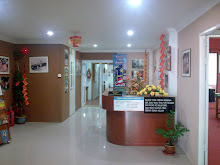The full effects of the global economic crisis could be felt on emerging economies in the first half of next year, Bank Negara governor Tan Sri Dr Zeti Akhtar Aziz said.
“We are monitoring growth in the fourth quarter very closely and the first half of next year when probably, the full effects of the crisis taking place in the developed countries will have an effect on the emerging economies,” she said.
“Right now, even in the third quarter, we have already seen the effects on our export sector,” she told reporters after the launch of HSBC Amanah Malaysia Bhd yesterday.
She said given Malaysia’s strong growth in the first half of this year, it was very likely that the growth for the full year would be between 5% and 5.5%.
Tan Sri Dato' Sri Dr. Zeti Akhtar Aziz (centre) at the launch of HSBC Amanah Malaysia Berhad on Tuesday.
“What has been driving our economy so far, for quite an extended period of time, is domestic demand. That is why we want to see most of the measures support domestic demand.
“That is the opportunity to sustain our economy, through the promotion of domestic demand in this very challenging external environment,” Zeti said.
She said the ringgit remained “relatively stable” against other currencies. “The depreciation has mainly been against the US dollar, it is relatively stable against other currencies including regional currencies,” she said.
On the central bank’s announcement to cut its benchmark overnight policy rate by 25 basis points to 3.25% from 3.50% on Monday, Zeti said:”We assessed the environment and our interest rates were already low and supportive of economic activity. This adjustment is intended to give further support.”
Zeti said the central bank would review the conditions and make assessments, moving forward. “We have the flexibility to undertake further measures,” she said.
Bank Negara also announced on Monday the reduction of the statutory reserve requirement (SRR) to 3.5% from 4% with effect from Dec 1. Zeti said it was not aimed at providing more liquidity as the system had “ample liquidity”.
“It is more to reduce the cost of intermediation for the banking system,” she said.
Earlier in her speech, Zeti said the international economic and financial environment was expected to be very challenging with several major economies in recession and continued uncertainties in the international financial system.
“In this challenging international financial environment, it is encouraging that Islamic finance has continued to demonstrate its evolution and strong growth,” she said.
Zeti said Islamic finance had become a new vehicle contributing to increasing the financial linkages not only within Asia but also with the rest of the world, thereby facilitating cross-border allocation of capital globally.
Islamic banking assets had expanded by 23% to RM234.9bil compared with a year ago, she said, adding that Islamic banking now accounted for 16.7% of total assets in the industry.
Zeti also said the Malaysian sukuk market had expanded significantly with an average annual growth rate of 22% since 2001. “Malaysia has acquired a unique market space for driving syariah-based innovation by combining the depth of knowledge with the drive for innovation,” she said.
On the potential role of foreign Islamic subsidiaries, Zeti said they were well positioned to engage in innovative product development in a more cost effective manner by leveraging on global networks available.
The subsidiaries also had an important role in enhancing linkages of the Islamic finance industry regionally and internationally, she added.
Wednesday, November 26, 2008
Subscribe to:
Post Comments (Atom)



.jpg)

No comments:
Post a Comment